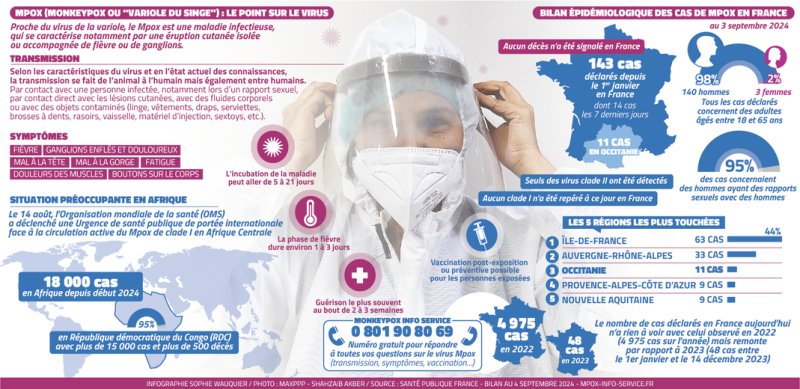“There will inevitably be other emergences”: Mpox specialist, Montpellier virologist Martine Peeters wants to understand in order to prevent

Les premières doses de vaccins sont arrivées en République démocratique du Congo, le 5 septembre. MAXPPP – DRC MINISTRY OF HEALTH/HANDOUT
A pest in Africa and a cause for concern on an international scale, Mpox, and the potentially fatal contagious infectious disease associated with the virus, has been monitored for years by a team of scientists based in Montpellier. Martine Peeters, already on the front lines of HIV and Ebola, describes the relentless hunt for the virus.
Virologist Martine Peeters leads a team from UMI 233, the unit on endemic and emerging infectious diseases at the IRD, a research institute for development, in Montpellier.

Virologist Martine Peeters, from the IRD (Institute of Research for Development), based in Montpellier. TRANSVIHMMI
Three years ago, you co-published in the prestigious scientific journal Nature, an article explaining that the Ebola virus "has woken up"… how did you go from Ebola to your current research on Mpox ?
But we started with HIV… We work on emerging issues, we adapt, and we try to be up to date with current events. It's a bit the same approach every time, only the technical tools change. HIV is a century-old story. We didn't have the same means, it's a disease with a long incubation period… With Mpox, we are now faced with another difficulty, we are working on an ongoing epidemic.
We are now better equipped to diagnose, characterize… Forty years ago, it was necessary to isolate the virus, sequence it with much lower resources than today, develop serological tests… Today everything is going much faster. And all the current tools were developed while we were working on HIV, including PCR tests.
The technique was then useful for Ebola, Mpox, Crimean-Congo hemorrhagic fever…
It's more reassuring to have all these tools, but it doesn't predict in any way what the epidemic will become…
No, of course. But today, we can analyze the situation much more quickly. Especially since we have transferred a lot of techniques to countries in the South.
Placide Mbala, head of the epidemiology and global health department and head of the pathogen genomics laboratory at the National Institute for Biomedical Research (INRB) in Kinshasa, on the front lines of the Mpox epidemic, did his thesis at the University of Montpellier. We have been working with the INRB for almost twenty years. And today other young scientists from the DRC, who are also working on Mpox, are being trained at the IRD in Montpellier. A doctoral student will defend his thesis at the end of the year… We have many partnerships with Africa, and we have set up all the tools that allow us to react quickly, on site, to an emergence, whether it is Mpox, Ebola, or an arbovirus. Everything is going much faster. Including in the implementation of means of control.
Mpox is a virus that is still very little known, even if you have carried out an initial sequencing, from 600 human samples collected in the DRC ?
Not much is known about Mpox. It was a neglected disease. It wasn't talked about. There were cases, but they were always in remote, sparsely populated areas, there was little human-to-human transmission. In our sample, the majority of viruses are said to be clade 1a, with transmission from animals to humans. But we need to understand why contaminations are exploding: is there more contact with wildlife when more people live in the forest?? Has biodiversity changed and meant that we are more in contact with the species that carry this virus?? Today, the virus has arrived in a populated area.

Mpox, an emerging disease that has become a public health problem. Midi Libre – SOPHIE WAUQUIER
In the DRC, the epidemic started in a mining area, which has a high concentration of people, a lot of activity, a mix of people, a lot of risky behavior. And I would like to remind you that the East of the DRC is in the grip of armed conflicts. There is a lot of migration, population movements. It is really a complicated area.
For Ebola, cases appeared in remote areas, which could be quickly controlled. The difficulties arose when cases appeared in the east of the country. The emergence of a disease depends on many factors.
“The presence of the virus has been identified in ten animals, rodents, monkeys…"
We don't even know the “reservoir" animal of the virus…
Today, there are barely ten animals in which the presence of the virus has been identified in the field. But we do not know the animal "reservoir" in fact.
In these ten animals, there are rodents, squirrels, monkeys… they may not be "reservoirs", but that does not prevent humans from becoming infected through contact with them.
The difficulty also comes from the fact that there is a very great diversity of virus strains, the clades, with possible human-to-human transmission for the one that we have named clade 1b. But we are not immune to the possibility that clade 1a, previously identified, will also be transmitted between humans.
The current issue is the risk of an outbreak of the epidemic, we are not immune to it ?
It all depends on the mode of transmission, the conditions, the lifestyles…
But whatever happens, we are not in the situation we experienced with Covid, nor with the HIV.
No, for Mpox, there is no aerosol transmission, direct contact is required. And HIV did not manifest itself immediately by external symptoms, it was necessary to wait ten years to know, and during this time, the sick were not treated, did not adapt their behavior. This is not the case for Mpox.
“There will inevitably be other emergences”
What will your next research focus on ?
Understanding where Mpox circulates in wildlife. This is a project that has been underway for two years now and is not very easy to set up: we are in a very large country, in the forest, with poorly accessible transport.
Beyond that, we are only at the beginning of the appearance of emerging diseases?
There will inevitably be other emergences, it is difficult to make predictions, in a context that is also the subject of economic issues. The best thing is to prevent, by understanding better what circulates in wildlife and the relationships between humans and wildlife.
I subscribe to read the rest



